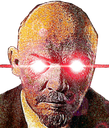Actually I think buh is Cormac McCarthy
Yllych
It's from blood Meridian
I don't hate him. To be generous, you could say his stance wrt the Soviet Union rhetorically useful. I do think there are other historians sympathetic to the Soviet Union that are more rigorous than him, Moshe Lewin or Domenico Losurdo for instance.
In my amateur political opinion, unless Die Linke seriously purges the reformist and squishier elements represented by the likes of Klaus Lederer  I think they'll be perennially unpopular, caught between what should be their radical roots and the nascent liberalism infiltrating the party.
I think they'll be perennially unpopular, caught between what should be their radical roots and the nascent liberalism infiltrating the party.
I skimmed their party program and the biggest impression I get is that it's soft and non explicit in their goal to eliminate capitalism, much reformist talk and none of revolution or workers' democracy. Let's be clear : at this current political moment, this rhetoric sucks ass and does nothing to galvanise workers. It's unfortunate that Wagenknecht is sorta beating them to the punch on this kind of transformation albeit I don't think she is a radical, maybe more chauvinist from what I've heard.
As an aside, personally I've always hated the branding of "democratic" socialism. I understand why socialists thought they had to use it but to me socialism is already the democratic choice, it brings democracy to the site of production not just government elections. To use democratic socialism seems redundant at best and cowardly at worst.
I like Michael Roberts the most in that he's probably the one I've read the most of lately. The book he wrote with Carchedi was quite good i thought especially the parts touching on "AI" and automation.
At what point in the history of the roman empire did the Praetorian guard fall apart?
Sorry we just don't like politicians who enable genocide
Notable previous employment: she worked for a lawfirm hired by Chevron in the Donzinger case.
✍️
Shadow employs dialectics
It is, Rosetta Stone is a pen name of his.
It was definitely initiated from the top down I would say. But at the end of the day, whatever mass strikes, work actions, and army mutinies occured were not enough to stop Yeltsin and the west from dissolving the SU into what it is now.
I don't want to mean this as blaming the average Soviet citizen but the fact is; whether from apathy with the old system, or naive hope that westernising would bring prosperity, or being outgunned by Yeltsins military, they and their organisations were sadly unable to defend the Soviet republics. All communists need to take sober lessons here. If it is the first task of the workers' party to instill a revolutionary spirit in the working class, the second and even harder one must be to convert that spirit into a mass commitment to the socialist project.





Says tweet not found